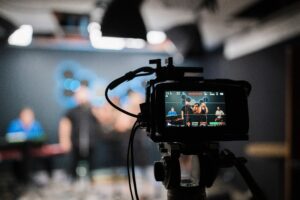
Accessibility is a fundamental right for people of all abilities. While ongoing efforts continue in the civic, corporate, education, private, and non-profit sectors to ensure inclusive and accessible accommodations for all abilities, little has been done to ensure the accessibility of music, arts, entertainment, and other forms of recreation. The Americans with Disabilities Act (ADA) has limited language surrounding this area of need, however it is just as important as any other aspect of accessibility.
While internet access has increasingly become a requirement for full participation in personal, professional, social, and civic life, Covid-19 has required us to live online like never before. A study in PC Magazine confirms Americans spend on average 40 hours weekly on devices, and communication regulator Ofcom confirms online time has increased by 36% since the pandemic began. Yet, 8.1 million Americans experience access issues due to a disability and Webaim found that 98% of the most viewed webpages had access issues.
People of all ages and abilities have faced many challenges in adapting to new ways of working, learning, socializing, shopping, and carrying out other essential tasks. In facing these challenges, there is also a great opportunity to learn and grow.
In our industry, Covid-19 has presented the need to examine and promote best practices in online accessibility so that producers of recreational online content gain a greater understanding of accessibility needs and solutions like captioning, American Sign Language (ASL), image and/or audio descriptions, website adjustments, and more.
By showcasing, promoting, and advising on best practices in online accessibility, Accessible Festivals aims to serve as a model and consultant to others who wish to provide accessible recreational activities online in response to the global pandemic.


